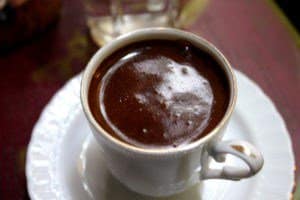 Cafestol is a diterpene molecule present in coffee. A typical bean of Coffea arabica contains about 0.6% cafestol by weight. Cafestol is present in its highest quantity in unfiltered coffee drinks such as French press coffee or Turkish coffee/Greek coffee. In filtered coffee drinks such as drip brewed coffee, it is present in only negligible amounts. Studies have shown that regular consumption of boiled coffee increases serum cholesterol by 8% in men and 10% in women. This increase in cholesterol, more specifically Low Density Lypoprotein (LDL) cholesterol has been linked to various cardiovascular diseases. Heavy consumption of cafestol is particularly a problem for those who have a genetic mutation that slows down metabolism of coffee in the body and is likely not an issue for the general population.
Cafestol is a diterpene molecule present in coffee. A typical bean of Coffea arabica contains about 0.6% cafestol by weight. Cafestol is present in its highest quantity in unfiltered coffee drinks such as French press coffee or Turkish coffee/Greek coffee. In filtered coffee drinks such as drip brewed coffee, it is present in only negligible amounts. Studies have shown that regular consumption of boiled coffee increases serum cholesterol by 8% in men and 10% in women. This increase in cholesterol, more specifically Low Density Lypoprotein (LDL) cholesterol has been linked to various cardiovascular diseases. Heavy consumption of cafestol is particularly a problem for those who have a genetic mutation that slows down metabolism of coffee in the body and is likely not an issue for the general population.
However, cafestol also has positive health effects. Cafestol, along with caffeic acid, are two compounds in coffee that have been associated with a decreased risk of type 2 diabetes. Cafestol up increases glucose uptake in muscle cells. This effect is compounded when coffee is consumed with glucose in the form of carbohydrates.
Along with type 2 diabetes, cafestol and other coffee oils such as kahweol have also been shown to have anti-inflammatory and anti-tumorigenic properties.